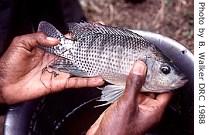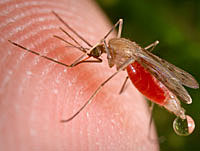-
(单词翻译:双击或拖选)
Nairobi
09 August 2007
In Kenya, environmental researchers say they may have discovered a new, effective weapon to combat malaria1. The disease kills more than 1 million people worldwide each year. Caroline Sawyer reports from our office in Nairobi that the weapon is a fish commonly found in Western Kenya.
 |
| Researchers hope the Nile Tilapia fish could help cut mosquito numbers in many areas of Africa plagued by Malaria |
These results are potentially life saving for local residents because malaria, which is spread through the bites of infected mosquitoes, kills more people here than any other disease.
According to the World Health Organization (WHO), approximately 40 percent of the world's population is at risk from the disease. In sub-Saharan Africa, malaria, which is caused by a parasite2, is responsible for over 3,000 deaths every day. The majority of victims are children under five years old.
 |
| Malaria is spread by mosquitoes |
"We were shocked to see how many malaria larvae6 were there and felt it was critical to reactivate those fish ponds," he noted7. "Of course, for that the ideal thing is to have a fish that is not only a good larvae eater, but also [the types] people like to eat, and the farmers can make an income [with]."
The number of people suffering from malaria has increased dramatically in the last 10 years. Scientists say this is partly due to the parasite's ability to become resistant8 to drugs, but they add that population movements and climate change also contribute to the rise. Researchers are working on a vaccine9, but progress has been slow.
The most effective way to prevent malaria is by sleeping under insecticide-treated bed nets, but many poor people in Sub-Saharan Africa cannot afford them.
Omlin's research on the Nile Tilapia published Thursday warns that this particular fish will not be able to help everyone.
"One has to operate with indigenous10 fish in order not to destroy or to affect the ecological11 balance in the environment," he explained. "One has to go local in a proper sense specific to find out which fish species are ideal and then make some very simple tests with that fish. Is that fish useful to the people? Do they like it for eating? Is it a good mosquito vacuum cleaner?"
Omlin says he hopes his work will encourage research on other indigenous fish that could help in other parts of the world. The United Nations estimates that malaria costs African countries $12 billion annually12.
 收听单词发音
收听单词发音
1
malaria

|
|
| n.疟疾 | |
参考例句: |
|
|
|
2
parasite

|
|
| n.寄生虫;寄生菌;食客 | |
参考例句: |
|
|
|
3
physiology

|
|
| n.生理学,生理机能 | |
参考例句: |
|
|
|
4
collapsed

|
|
| adj.倒塌的 | |
参考例句: |
|
|
|
5
stagnant

|
|
| adj.不流动的,停滞的,不景气的 | |
参考例句: |
|
|
|
6
larvae

|
|
| n.幼虫 | |
参考例句: |
|
|
|
7
noted

|
|
| adj.著名的,知名的 | |
参考例句: |
|
|
|
8
resistant

|
|
| adj.(to)抵抗的,有抵抗力的 | |
参考例句: |
|
|
|
9
vaccine

|
|
| n.牛痘苗,疫苗;adj.牛痘的,疫苗的 | |
参考例句: |
|
|
|
10
indigenous

|
|
| adj.土产的,土生土长的,本地的 | |
参考例句: |
|
|
|
11
ecological

|
|
| adj.生态的,生态学的 | |
参考例句: |
|
|
|
12
annually

|
|
| adv.一年一次,每年 | |
参考例句: |
|
|
|















